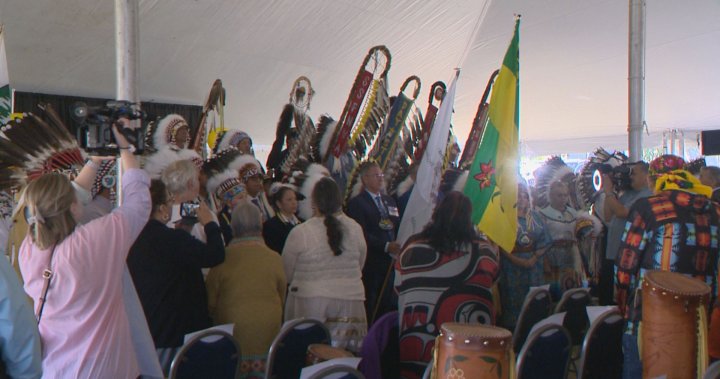Hundreds gathered in Fort Qu’Appelle, Sask., to commemorate the 150th anniversary of the signing of Treaty Four. Indigenous leaders emphasized the significance of this treaty, which formalized the relationship between Indigenous Peoples of Canada and the Crown. Dignitaries such as Premier Scott Moe and Lieutenant Governor Russ Mirasty were present at the event. Various First Nations Chiefs, including Chief Lynn Acoose of Zagime Anishibek First Nation, stressed the sacred nature of the treaty, highlighting the importance of peaceful co-existence and the bringing of Indigenous laws and beliefs to the agreement.
During the event, Mirasty presented King Charles III coronation medals to several chiefs, who shared their personal stories with the attendees. The gathering took place in a tent on Treaty Four territory, where the treaty was originally signed in 1874. Parry Bellegarde, former chief of the Assembly of First Nations (AFN), underlined the importance of acknowledging the darker aspects of history, such as the enactment of the Indian Act in 1876, just two years after the treaty. He emphasized the impacts of this legislation, which restricted Indigenous peoples’ movements, access to legal representation, and voting rights for several decades.
Bellegarde described the Indian Act as a tool for colonizing and controlling Indigenous communities, emphasizing the ongoing need to work towards the full implementation of the treaty in alignment with its spirit and intent, rather than a legalistic interpretation. Current AFN Chief Cindy Woodhouse Nipenak echoed this sentiment, highlighting the importance of understanding shared history while also focusing on building a future together. She emphasized the necessity of addressing challenging issues through open dialogue, even when they may be uncomfortable, in order to foster collaboration and progress in Indigenous-Crown relations.
Reflecting on the past atrocities and injustices faced by Indigenous Peoples in Canada, the event served as a reminder of the ongoing journey towards reconciliation and healing. The speakers emphasized the need for acknowledging historical injustices, such as the Indian Act and other oppressive policies, while also highlighting the resilience and strength of Indigenous communities. By coming together to commemorate and reflect on the significance of Treaty Four, attendees were able to reaffirm their commitment to working towards a future of mutual respect, understanding, and partnership between Indigenous Peoples and the Crown.
As the event concluded, participants expressed a shared commitment to continued dialogue, education, and collaboration in order to address the complex challenges that lie ahead. The significance of treaties like Treaty Four, and the historical agreements they represent, serves as a foundation for meaningful reconciliation and the building of positive relationships between Indigenous Peoples and the Crown. Moving forward, the emphasis remains on working together, learning from the past, and striving towards a future where Indigenous rights, cultures, and traditions are respected and upheld in partnership with the broader Canadian society.


